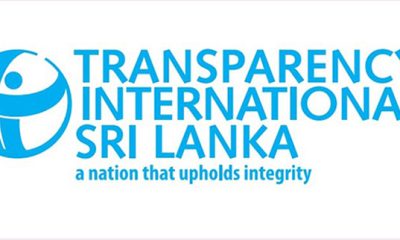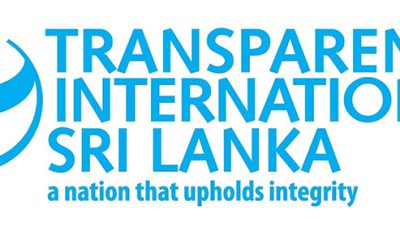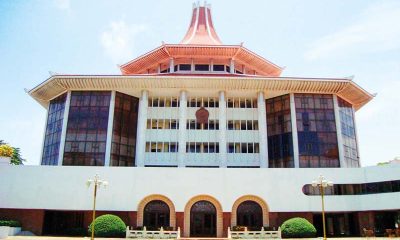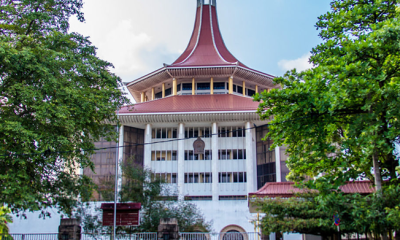News
SC ruling on economic collapse: TISL expects Parliament to act

By Shamindra Ferdinando
Executive Director, Transparency International Sri Lanka (TISL), Attorney-at-Law, Nadishani Perera yesterday (15) said that it would be the responsibility of the Parliament and relevant institutions to take appropriate actions in the wake of the landmark Supreme Court judgment pertaining to the unprecedented economic crisis.
Lawyer Perera said so in response to The Island query regarding the status of Sanjeeva Jayawardena, PC, and Dr. Ranee Jayamaha, both members of the Monetary Board who had served the body during the tenure of Prof. W.D. Lakshman (Dec 2019-Sept 2021) and Ajith Nivaard Cabraal (Sept 2021-March 2022) as the Governor of the Monetary Board.
The SC found fault with the Monetary Board for the economic crisis. Jayawardena and Jayamaha continued to serve the Monetary Board whereas Samantha Kumarasinghe was replaced in the wake of the political crisis triggered by the economic collapse.
TISL is one of the petitioners among those who filed FR cases heard before the five-judge bench of the apex court. Chief Justice Jayantha Jayasuriya, PC, Justices Buwaneka Aluwihare, PC, Priyantha Jayawardana, PC, Vijith K. Malalgoda, PC, and Murdu N.B. Fernando, PC.
Lawyer Perera emphasized the need for a dialogue over the SC ruling. The SC faulted former President Gotabaya Rajapaksa, former Finance Ministers Mahinda Rajapaksa and Basil Rajapaksa, former Presidential Secretary Dr. P.B. Jayasundera, former CBSL Governors Prof. W.D. Lakshman and Ajith Nivard Cabraal and former Treasury Secretary S.R. Attygalle et al.
The other petitioners were Dr. Athulasiri Kumara Samarakoon, Soosaiappu Neavis Morais, Dr. Mahim Mendis, Chandra Jayaratne, Julian Bolling and Jehan Canagaretna.
Even President Ranil Wickremesinghe, in his capacity as the Finance Minister, has been named as a respondent.
Petitioners asserted that a series of decisions taken during the relevant period, including the decisions to revise taxes, artificial control of the exchange rate, failure to maintain official reserves leading to their serious depletion, failure to seek the IMF’s intervention and the failure to make necessary adjustments to the interest rates caused the economic collapse.
Latest News
Navy seize an Indian fishing boat poaching in Mannar seas

During an operation conducted in the dark hours of 22 Feb 26, the Sri Lanka Navy seized an Indian fishing boat and apprehended twelve (12) Indian fishermen while they were poaching in Sri Lankan waters, in the sea area south of Mannar.
The seized boat and the Indian fishermen were handed over to the Fisheries Inspector of Dikovita for onward legal proceedings.
News
Families of those sentenced to death for killing MP Atukorale seek AKD’s intervention
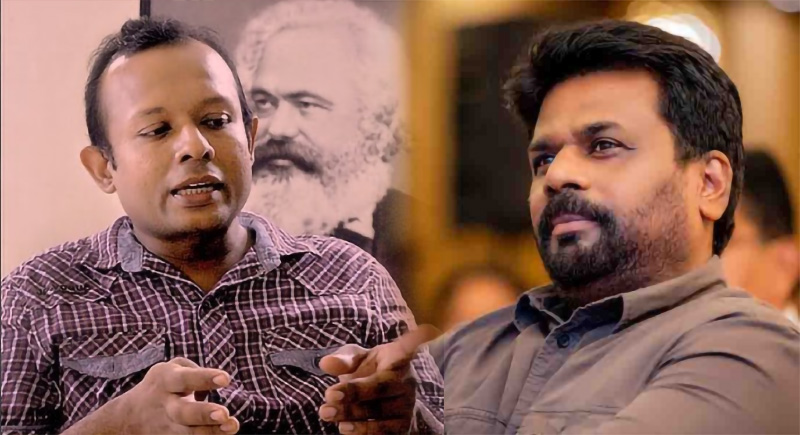
FSL assures legal backing for them
Families of those sentenced to death by the Three-member Gampaha High Trial-at-Bar, over the killing of SLPP MP Amarakeerthi Atukorale, and his police bodyguard, met a senior official of the Presidential Secretariat, yesterday (23), to seek backing for their move to appeal against the verdict.
Having made representations, they addressed the media, outside the Presidential Secretariat, where they declared their intention to move the higher court against the decision.
The SLPP MP and his security officer were killed by an Aragalaya mob on 09 May, 2022, at Nittambuwa. The same day Aragalaya mobs unleashed violence against the then government MPs across the country, torching dozens of their properties.
The Frontline Socialist Party (FSP) yesterday said that they would help the families of those sentenced to death to move court against the Gampaha High Court Trial-at-Bar decision. Responding to The Island queries, FSP spokesman Pubudu Jayagoda said that their representatives had already met the families and necessary work was being done to move the Supreme Court. Twenty three persons were acquitted and four handed six-month prison terms, suspended for five years
Jayagoda said that one of the HC judges differed in the ruling. Asked whether they received backing from any other political party and groups that had been involved in the 2022 protest campaign to defend those who had been found guilty, Jayagoda said such support was lacking.
The JVP/NPP played a significant role in the violent protest campaign that forced President Gotabaya Rajapaksa to step down. Pointing out that the Attorney General, too, was appealing against the court decision on the basis that the number of persons sentenced to death should be much higher, Jayagoda said that the Nittambuwa incident couldn’t be examined in isolation without taking into consideration the SLPP goon attack on Galle Face protesters on 09 May, 2022. (SF)
News
OPV leaves Baltimore, expected in Colombo in May

Offshore Patrol Vessel P 628 of the Sri Lanka Navy departed Baltimore, USA, for Colombo, on 20 February.
The ex-United States Coast Guard Cutter, USCGC Decisive was officially handed over to the SLN on 02 December, 2025, as the latest addition to the SLN fleet, under the Pennant Number P 628.
Measuring 64 metres in length, this ‘B-Type Reliance Class 210-foot Cutter’ is equipped with advanced technological systems and facilities, capable of conducting extensive surveillance operations spanning up to 6,000 nautical miles per patrol.
The vessel’s voyage to Colombo is historic, possibly marking the longest-ever passage undertaken by a Sri Lanka Navy ship. Covering approximately 14,775 nautical miles, the journey will see the P 628 navigate from Baltimore through the Atlantic Ocean, the Panama Canal (a first for a Sri Lankan naval vessel), the Pacific Ocean, and into the Indian Ocean, via the Straits of Malacca. The ship is expected to arrive in Sri Lanka during the first week of May, 2026.
-

 Features3 days ago
Features3 days agoWhy does the state threaten Its people with yet another anti-terror law?
-

 Features3 days ago
Features3 days agoReconciliation, Mood of the Nation and the NPP Government
-

 Features3 days ago
Features3 days agoVictor Melder turns 90: Railwayman and bibliophile extraordinary
-

 Features2 days ago
Features2 days agoLOVEABLE BUT LETHAL: When four-legged stars remind us of a silent killer
-

 Features3 days ago
Features3 days agoVictor, the Friend of the Foreign Press
-

 Latest News4 days ago
Latest News4 days agoNew Zealand meet familiar opponents Pakistan at spin-friendly Premadasa
-

 Latest News4 days ago
Latest News4 days agoTariffs ruling is major blow to Trump’s second-term agenda
-

 Latest News4 days ago
Latest News4 days agoECB push back at Pakistan ‘shadow-ban’ reports ahead of Hundred auction


